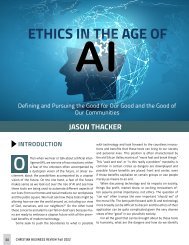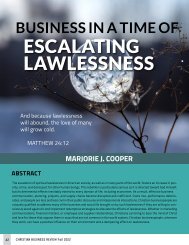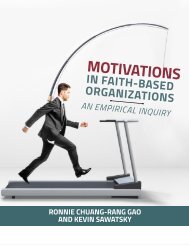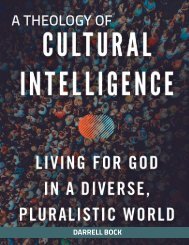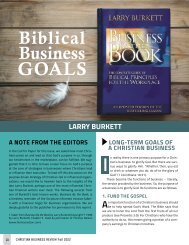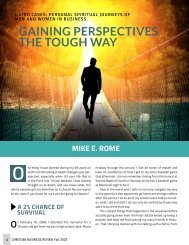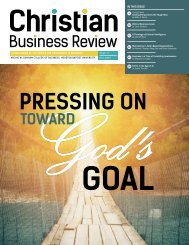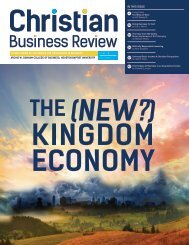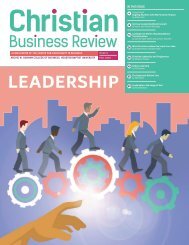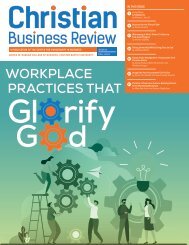Christian Business Review 2018: Kingdom Business in the Brave New World (Issue 7)
Create successful ePaper yourself
Turn your PDF publications into a flip-book with our unique Google optimized e-Paper software.
artificial <strong>in</strong>telligence<br />
cbr articles<br />
with<strong>in</strong> <strong>the</strong> workplace, without <strong>the</strong> restra<strong>in</strong>ts and edify<strong>in</strong>g<br />
vision of <strong>the</strong> Transcendent can rob workers of <strong>the</strong>ir sense<br />
of purpose and <strong>the</strong> workplace of its sanctity.<br />
Future workplace expert Jeanne Meister sees a direct<br />
impact by AI on a corporate culture that embraces <strong>the</strong> idea<br />
of vocation, and not merely occupation. “For many, work is<br />
more than a job; it’s a higher call<strong>in</strong>g, … So it is important<br />
that <strong>the</strong> company communicate a common purpose, be<br />
it through corporate philanthropy or service to <strong>the</strong> community.”<br />
16<br />
The human must not be absorbed <strong>in</strong>to <strong>the</strong><br />
mach<strong>in</strong>e<br />
The dream of immortality has seeped <strong>in</strong>to <strong>the</strong> cyberworld.<br />
Kurzweil, for example, th<strong>in</strong>ks, that by <strong>the</strong> end of <strong>the</strong><br />
twenty-first<br />
century, humans<br />
will be<br />
able to upload<br />
<strong>the</strong>ir bra<strong>in</strong>s<br />
<strong>in</strong>to computers.<br />
There<br />
would even be<br />
an automatic<br />
update with<br />
every advance<br />
of computer<br />
technology, assur<strong>in</strong>g us a k<strong>in</strong>d of eternal life. “Our immortality<br />
will be a matter of be<strong>in</strong>g sufficiently careful to make<br />
frequent backups.” 17<br />
While that future “paradise” is still <strong>in</strong> <strong>the</strong> future, <strong>the</strong>re<br />
is already <strong>the</strong> danger of human be<strong>in</strong>gs be<strong>in</strong>g swallowed<br />
up <strong>in</strong> <strong>the</strong> computerized workplace. There, cyber-development<br />
becomes more important than human resource<br />
development.<br />
Idealism must not cloud reality<br />
Western thought and civilization have passed through <strong>the</strong><br />
Classical Age, <strong>in</strong>to <strong>the</strong> Age of Barbarism, <strong>in</strong>to <strong>the</strong> Medieval<br />
period, Renaissance, Enlightenment, Age of Reason,<br />
Romanticism, Modernism, and Postmodernism. Some<br />
would say we are now <strong>in</strong> a period of post-post modernism<br />
<strong>in</strong> which <strong>the</strong>re is a strange union of <strong>the</strong> technological and<br />
<strong>the</strong> mystic-spiritual.<br />
Romantic idealism is a new danger haunt<strong>in</strong>g <strong>the</strong> development<br />
and deployment of artificial <strong>in</strong>telligence. Weizenbaum<br />
provides an example of this, when he says that<br />
“<strong>the</strong> computer programmer is a creator of universes for<br />
which be alone is <strong>the</strong> lawgiver…” 18 Intended or not, Weizenbaum<br />
warns aga<strong>in</strong>st <strong>the</strong> hubris that clouds outcomes<br />
<strong>in</strong> <strong>the</strong> m<strong>in</strong>ds of many who develop and program artificial<br />
<strong>in</strong>telligence mach<strong>in</strong>es.<br />
Herzfeld, quot<strong>in</strong>g Dreyfus, op<strong>in</strong>ed that “Wishful th<strong>in</strong>k<strong>in</strong>g<br />
has probably always complicated our relations with<br />
technology ... However, it is safe to assert that before <strong>the</strong><br />
computer, and before <strong>the</strong> bomb, <strong>the</strong> complications weren’t<br />
as dangerous as <strong>the</strong>y are today. Nor was <strong>the</strong> wishful th<strong>in</strong>k<strong>in</strong>g<br />
as fantastic.” 19<br />
But it was perhaps French <strong>the</strong>ologian-philosopherlawyer<br />
Jacques Ellul who best captured <strong>the</strong> subtle portents<br />
of <strong>the</strong> technology that is produc<strong>in</strong>g AI not only for jobs,<br />
but for all fields of human endeavor. Writ<strong>in</strong>g <strong>in</strong> 1990, Ellul<br />
expressed concern for <strong>the</strong> “optimism” of technicians who<br />
are driven by “an absolute belief <strong>in</strong> unlimited progress.”<br />
In <strong>the</strong> face of every problem, <strong>the</strong>y live by a faith creed that<br />
“technical progress will deal with it.” This, says Ellul, is “an<br />
absolute form of <strong>the</strong> technological bluff.” 20 The “bluff,” of<br />
course, is <strong>in</strong> <strong>the</strong> failure of <strong>the</strong> article of faith. In <strong>the</strong> case<br />
of <strong>the</strong> workplace <strong>the</strong> stunn<strong>in</strong>g “technical progress” of AI<br />
has dealt with <strong>the</strong> consequences of “unlimited progress,”<br />
but, <strong>in</strong> <strong>the</strong> process,<br />
has created<br />
The human, <strong>the</strong> Imago Dei, is not to<br />
turn over his or her authority to <strong>the</strong><br />
mach<strong>in</strong>e, imago hom<strong>in</strong>is. And because<br />
work is <strong>in</strong>herent <strong>in</strong> <strong>the</strong> orig<strong>in</strong>al purpose<br />
of <strong>the</strong> human be<strong>in</strong>g, work must<br />
not be abandoned to <strong>the</strong> mach<strong>in</strong>e.<br />
new problems.<br />
The hope is that<br />
<strong>in</strong> <strong>the</strong> quest for<br />
solutions to those<br />
difficulties, <strong>the</strong>re<br />
will be an advance<br />
of learn<strong>in</strong>g that<br />
will benefit those<br />
hurt <strong>the</strong> most.<br />
However, this will<br />
never happen if <strong>the</strong>re is not a realistic assessment of <strong>the</strong><br />
negative impacts that must be resolved.<br />
Human telos (ultimate purpose) must not<br />
be sublimated to cyber expediency and<br />
utility<br />
God’s <strong>in</strong>itial call on <strong>the</strong> human be<strong>in</strong>g is expressed <strong>in</strong> Genesis<br />
1:27-28:<br />
“God created man <strong>in</strong> His own image, <strong>in</strong> <strong>the</strong> image<br />
of God He created Him; male and female He created<br />
<strong>the</strong>m. God blessed <strong>the</strong>m; and God said to <strong>the</strong>m, “Be<br />
fruitful and multiply, and fill <strong>the</strong> earth, and subdue<br />
it...”<br />
Genesis 2:15 reveals how <strong>the</strong> human is to carry out<br />
<strong>the</strong> assignment. “Then <strong>the</strong> Lord took <strong>the</strong> man and put him<br />
<strong>in</strong>to <strong>the</strong> Garden of Eden to cultivate it and keep it” (Italics<br />
added). Thus <strong>the</strong> “Dom<strong>in</strong>ion Mandate” of Genesis 1:27-<br />
28 is not about exploitation and mastery, but about <strong>the</strong><br />
care expressed <strong>in</strong> <strong>the</strong> ideas of “cultivat<strong>in</strong>g” and “keep<strong>in</strong>g.”<br />
Fur<strong>the</strong>r, <strong>the</strong> Garden of Eden is <strong>the</strong> prime Old Testament<br />
type of <strong>the</strong> <strong>K<strong>in</strong>gdom</strong> of God. The world will return to that<br />
prist<strong>in</strong>e state when Christ returns at <strong>the</strong> end of f<strong>in</strong>ite time<br />
(kronos) and <strong>the</strong> world undergoes a restoration to its<br />
orig<strong>in</strong>al, “m<strong>in</strong>t” condition. (Acts 3:19-21)<br />
10<br />
CHRISTIAN BUSINESS REVIEW Fall <strong>2018</strong>




